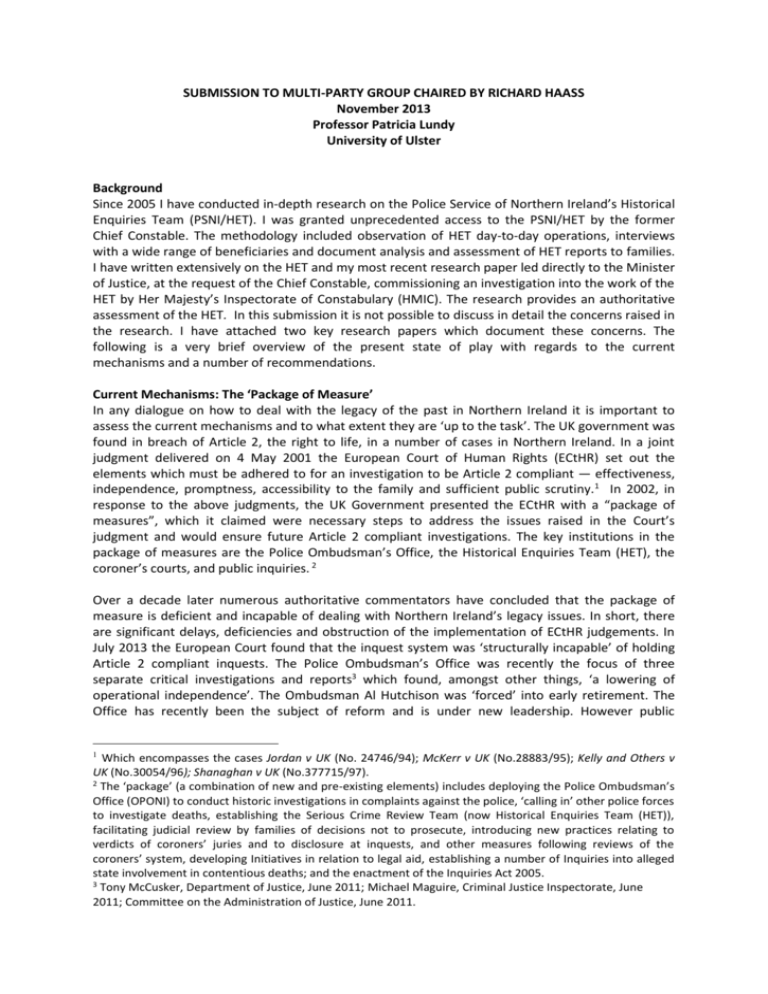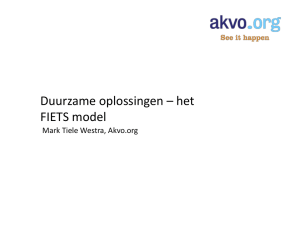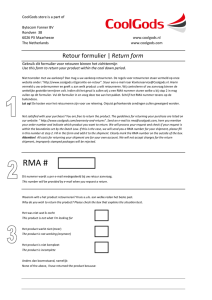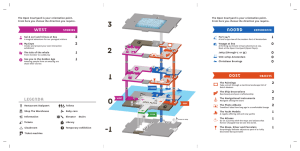Microsoft Word - Ulster Institutional Repository
advertisement

SUBMISSION TO MULTI-PARTY GROUP CHAIRED BY RICHARD HAASS November 2013 Professor Patricia Lundy University of Ulster Background Since 2005 I have conducted in-depth research on the Police Service of Northern Ireland’s Historical Enquiries Team (PSNI/HET). I was granted unprecedented access to the PSNI/HET by the former Chief Constable. The methodology included observation of HET day-to-day operations, interviews with a wide range of beneficiaries and document analysis and assessment of HET reports to families. I have written extensively on the HET and my most recent research paper led directly to the Minister of Justice, at the request of the Chief Constable, commissioning an investigation into the work of the HET by Her Majesty’s Inspectorate of Constabulary (HMIC). The research provides an authoritative assessment of the HET. In this submission it is not possible to discuss in detail the concerns raised in the research. I have attached two key research papers which document these concerns. The following is a very brief overview of the present state of play with regards to the current mechanisms and a number of recommendations. Current Mechanisms: The ‘Package of Measure’ In any dialogue on how to deal with the legacy of the past in Northern Ireland it is important to assess the current mechanisms and to what extent they are ‘up to the task’. The UK government was found in breach of Article 2, the right to life, in a number of cases in Northern Ireland. In a joint judgment delivered on 4 May 2001 the European Court of Human Rights (ECtHR) set out the elements which must be adhered to for an investigation to be Article 2 compliant — effectiveness, independence, promptness, accessibility to the family and sufficient public scrutiny.1 In 2002, in response to the above judgments, the UK Government presented the ECtHR with a “package of measures”, which it claimed were necessary steps to address the issues raised in the Court’s judgment and would ensure future Article 2 compliant investigations. The key institutions in the package of measures are the Police Ombudsman’s Office, the Historical Enquiries Team (HET), the coroner’s courts, and public inquiries. 2 Over a decade later numerous authoritative commentators have concluded that the package of measure is deficient and incapable of dealing with Northern Ireland’s legacy issues. In short, there are significant delays, deficiencies and obstruction of the implementation of ECtHR judgements. In July 2013 the European Court found that the inquest system was ‘structurally incapable’ of holding Article 2 compliant inquests. The Police Ombudsman’s Office was recently the focus of three separate critical investigations and reports3 which found, amongst other things, ‘a lowering of operational independence’. The Ombudsman Al Hutchison was ‘forced’ into early retirement. The Office has recently been the subject of reform and is under new leadership. However public 1 Which encompasses the cases Jordan v UK (No. 24746/94); McKerr v UK (No.28883/95); Kelly and Others v UK (No.30054/96); Shanaghan v UK (No.377715/97). 2 The ‘package’ (a combination of new and pre-existing elements) includes deploying the Police Ombudsman’s Office (OPONI) to conduct historic investigations in complaints against the police, ‘calling in’ other police forces to investigate deaths, establishing the Serious Crime Review Team (now Historical Enquiries Team (HET)), facilitating judicial review by families of decisions not to prosecute, introducing new practices relating to verdicts of coroners’ juries and to disclosure at inquests, and other measures following reviews of the coroners’ system, developing Initiatives in relation to legal aid, establishing a number of Inquiries into alleged state involvement in contentious deaths; and the enactment of the Inquiries Act 2005. 3 Tony McCusker, Department of Justice, June 2011; Michael Maguire, Criminal Justice Inspectorate, June 2011; Committee on the Administration of Justice, June 2011. confidence was shaken in this important element of the package of measures. The former Police Ombudsman publicly acknowledged that the current number of historic cases referred by HET will take his office 50+ years to complete; more cases are likely to follow. The HET: Research Findings and Assessment The following is a summary of my research findings on the HET. The HET is promoted by the PSNI and Northern Ireland Office (NIO) as an effective mechanism capable of meeting victims’ needs and delivering its objectives. The research provides empirical evidence which qualifies and/or challenges official claims of efficiency and whether objectives have been met. The research found differentiation in treatment and deficiencies in PSNI/HET investigations. It exposed anomalies and inconsistencies in the investigation process where State agencies were involved compared to nonstate or paramilitary suspects. It raised questions about the ability of the HET to undertake independent, impartial, effective investigations in cases involving State agencies and/or that may touch upon the police themselves; and whether it was Article-2 compliant and UK government obligations deriving from ECtHR judgements were being met. It found that there was lack of independence relating to the role of intelligence gatekeepers and the influence of ‘corporate or institutional memory’ through rehiring of retired police officers. This led to serious questions being raised about the lack of oversight, and practice, of rehiring retired police officers as part of HET. Every stage of HET’s work was found to be compromised by lack of independence. Recent changes have exacerbated these problems; HET no longer has responsibility for investigations where historic reviews identify evidential, arrest and prosecution opportunities. These cases are now transferred and are under the control of C2 Department of the Police Service of Northern Ireland (PSNI). The research also found that access to the ‘truth’ was delimited by HET procedures and victims had to know the ‘right questions’ to ask. The quality and depth of reports improved significantly when NGOs, legal or other representatives assisted victims’ families. The Unionist community, and bereaved families of the British army, were shown to be less well represented. This lack of representation influenced the quality of their HET reports and access to justice. In contrast to official claims, interviews with victims revealed dissatisfaction with HET output and a failure to answer some families’ questions. However, other families have expressed satisfaction with the HET process and their reports. HM Inspectorate of Constabulary’s (HMIC) Inspection of HET HM Inspectorate of Constabulary’s (HMIC) inspection report was highly critical of HET (July 2013). 4 The inspection focused on whether the HET’s approach to reviewing military cases conforms to current policing standards and policy; if it adopts a consistent approach to all cases (i.e. both military and paramilitary cases); and if the HET’s review process meets the requirements that would ensure it is compliant with Article 2 of the European Convention on Human Rights and Fundamental Freedoms (i.e. independence, effectiveness, promptness, and transparency and accountability). HMIC inspection found that: The HET is not conforming to current policing standards in a significant number of important areas. In particular, HMIC found a lack of explicit systems and processes; different teams adopting different working practices; no clearly defined complaints process; and no independent review of the HET’s processes; 4 Inspection of the Police Service of Northern Ireland Historical Enquiries Team, HMIC 2013 http://www.hmic.gov.uk/media/inspection-of-the-police-service-of-northern-ireland-historical-enquiriesteam-20130703.pdf The HET treats state involvement cases differently as a matter of policy and this appears to be based on a misinterpretation of the law. This is entirely wrong, and has led to state involvement cases being reviewed with less rigour in some areas than non-state cases; and As a result, HMIC considers that the HET’s approach to state involvement cases is inconsistent with the UK’s obligations under Article 2 ECHR. HMIC concluded that the HET had acted outside the law and that many of these findings had been made in 2009 and for four years nothing was done to address those findings. Northern Ireland Policing Board, Working Group on HET As a consequence of HMIC’s critical report, the NIPB expressed a lack of confidence in the leadership of the HET. The NIPB set up a Working Group to oversee HMIC’s recommendations. I am firmly of the view that HMIC’s recommendations did not go far enough. HET is irretrievable. I agree with other commentators that it cannot be made Article 2 compliant; it will not meet the required benchmarks.5 To ‘patch it up’ with even further PSNI involvement will not restore trust and confidence in this highly damaged process. HMIC recommended an Oversight Panel as a means to monitor the work of the HET. I doubt whether a panel, even if made up of five or six respected individuals, employed on a full time basis, with unfettered access, could satisfactorily retrieve the situation. Families and NGOs have lost faith in the process. This is the crux of the matter. A range of victims groups and human rights NGOs have unanimously and publicly stated that they ‘would not recommend any family to engage with HET’. Commissioning the Past: An Alternative Model There is now considerable empirical evidence that the ‘package of measures’ is not working and an alternative model is required. Internationally, governments, policy makers and civil society have grappled with finding appropriate mechanisms. In Northern Ireland, the policy approach has been fragmented and highly contested. The alternative model takes as its starting point the ‘transitional justice’ mechanisms employed in other transitional societies, and seeks to tailor such solutions to Northern Ireland. An alternative model received some powerful support when in 2009, the former UK government-appointed Consultative Group on the Past (CGP), led by Lord Eames and Denis Bradley, issued a report recommending the establishment of a Legacy Commission for Northern Ireland, largely along international truth commission lines. The core proposal was the establishment of an independent Legacy Commission that would create processes of reconciliation, justice and information recovery. It was envisaged that there would be review and investigation of historical cases; a process of information recovery; and examination of linked or thematic cases emerging from the conflict. These proposals drew on extensive consultations across Northern Ireland. The UK government has yet to make a decision on the CGP recommendations and the mandate of such an institution remains subject to contestation. The Consultative Group ruled out a general amnesty but proposed a protected statement. According to this process confidential statements could be made to the Information Recovery Unit and the Thematic Examination Unit when prosecutions are deemed unlikely due to lack of evidence. Such statements would not be admissible in criminal or civil proceedings. It is the statement that is protected and not the person. The aim is to encourage free and frank disclosure of information relevant to a particular case. It is now crystal clear that unqualified or blanket amnesty for those 5 “Even with significant reform CAJ does not believe it is possible for the HET to meet the necessary requirements of independence and impartiality in relation to state involvement cases”; see, S420 CAJ’s submission to the Northern Ireland Policing Board Working Group on the PSNI, Historical Enquiries Team (HET), http://www.caj.org.uk/contents/1202 accused of serious violations are regarded as in violation of international human rights law. The international community has also moved away from granting conditional amnesties for serious human rights violations similar to the one adopted in the South African TRC.6 Yet empirical data on amnesty provision between 2001 and 2005 shows that amnesties have continued to be a political reality despite international efforts to combat impunity.7 Thus international debate continues on, whether measures short of an amnesty could be considered as an acceptable compromise in certain circumstances. Priscilla Hayner notes that, “there remain many areas not prescribed by law, and which allow a range of policy options for national actors.”8 While in principle there are legally binding international standards, it would appear there is room for flexibility that does not preclude a form of amnesty in certain circumstances (other than for gross human rights abuses), if accompanied by alternative mechanisms to fulfil victims’ rights and in the interest of peace and stability. In Northern Ireland, any alternative model would require some form of immunity in order to provide incentive for individuals and/or groups to come forward and disclose information. Why would someone volunteer to come forward and run the risk of self-incrimination? An incentive or guarantee is therefore likely to be required in order to encourage cooperation with any proposed information recovery process. The CGP proposals remain the best effort to date to comprehensively deal with the past in Northern Ireland. However, a fundamental weakness of the CGP initiative was that it did not take stock of existing measures; this was outside its remit. The consequence was policy-makers and civil society could not substantiate whether the Legacy Commission was an improvement, or would add value, to existing measures. This gap in knowledge created difficulties in conclusively resolving the debate. It is now clear that the ‘package of measures’ is not working and is incapable of adequately dealing with the past. An information recovery process, or Legacy Commission as proposed by the CGP, would be an improvement on what is currently on offer. The Current Impasse: A Way Forward Recommendations should include the following: 1. An independent information recovery process. 2. Principles that underpin the process. The principles should include independence, effectiveness, transparency, investigative, inclusiveness (all parties to the conflict must sign up to it), victim centred, thematic; staff should be multidisciplinary (legal, police, statisticians, researchers, human rights experts, academics, forensic skills etc.); international and local mix of personnel. 3. A panel of experts to oversee the implementation of the recommendation. A panel of international standing should be appointed to act as an Independent Interim Oversight Panel to take the recommended information recovery process forward. If an Interim Panel were to be appointed it could select an independent multidisciplinary team to 6 Francesca Pizzutelli, Amnesty International, “What is required to make the Legacy Commission compliant with human rights obligations?” Panel 2, Reflecting on the Report of the Consultative Group on the Past, Seminar 14 & 15 May, 2009, Seminar Report, produced by CAJ, pp. 16-17. 7 Louise Mallinder, “Can Amnesties and International Justice be Reconciled?” International Journal of Transitional Justice, Vol. 1, No.2, 2007, pp.208-230. 8 Priscilla Hayner, “Negotiating Justice: Guidance for Mediators Report,” Centre for Human Dialogue and ICTJ, February 2009, p. 9. advise and assist in defining the terms of reference, scope and remit and other matters. The formation of an information recovery process determined through an independent process will build greater public confidence and create a sense of legitimacy in the process from the outset. Patricia Lundy Professor of Sociology Sociology Department University of Ulster Jordanstown Shore Road Northern Ireland p.lundy@ulster.ac.uk



